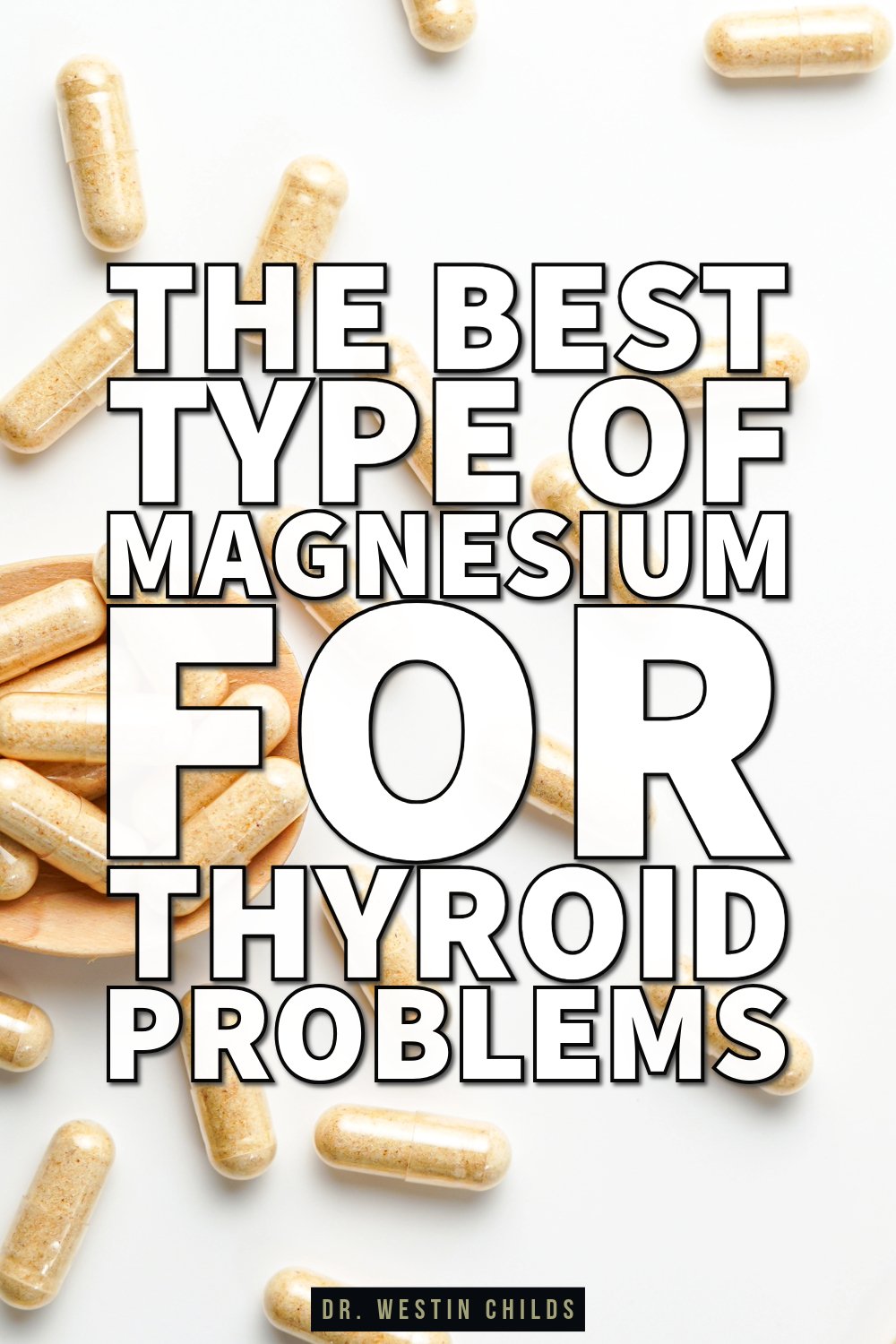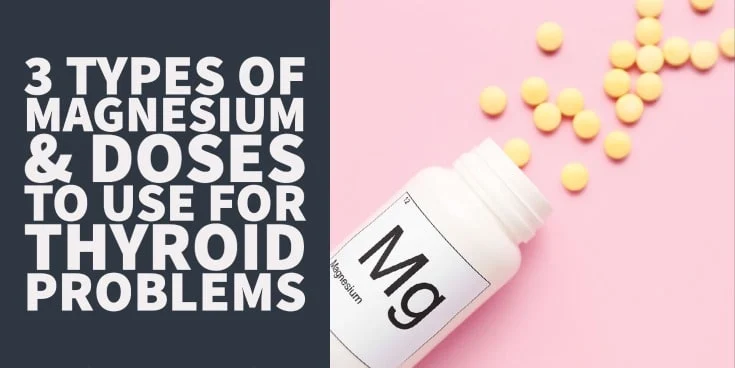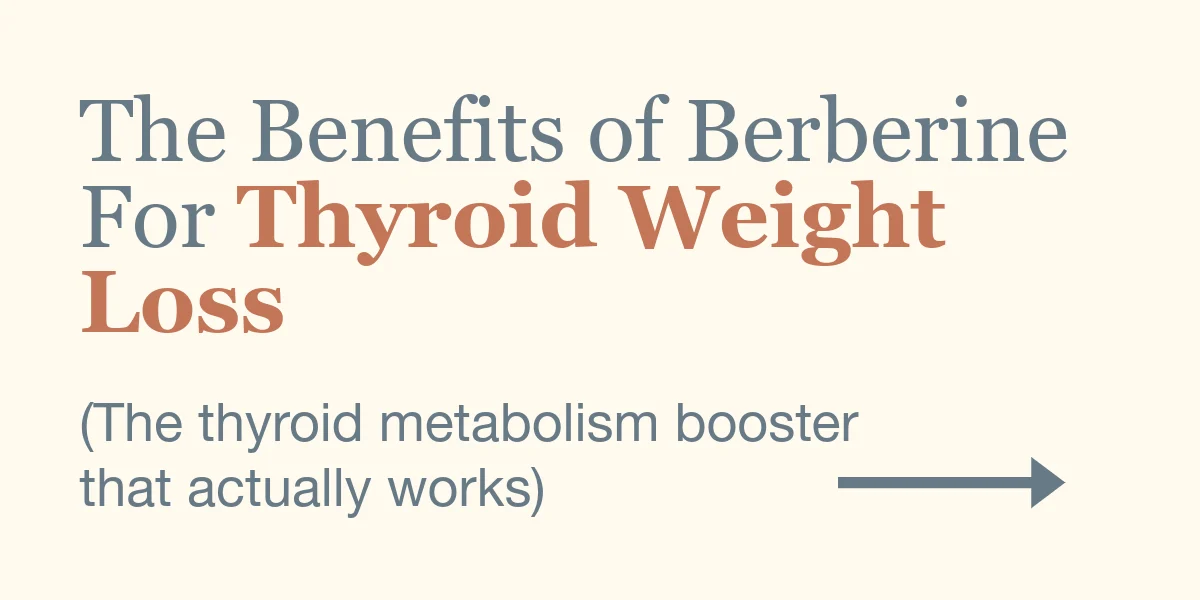If you’ve been a thyroid patient for any length of time then I probably don’t need to convince you that magnesium is important…
But, I’m going to jog your memory just in case you needed it!
Here are a few reasons you want your magnesium levels optimized:
- Magnesium is required for over 300 reactions involving metabolism (1).
- Your body needs magnesium to produce energy in the form of ATP (2).
- It’s necessary for receptor binding, muscle contraction, neural activity, neurotransmitter release, and cardiac excitability.
- And, finally, magnesium deficiency increases your risk of developing thyroid antibodies (3).

In other words, a lot of different cells need magnesium.
But, as I mentioned, most thyroid patients are aware of this which is why they are actively looking to get more magnesium into their bodies in the form of supplements!
That’s all well and good but it’s not quite as straightforward as you might think.
When you look at magnesium supplements, you’ll find that there are many different types and formulations that all provide slightly different benefits.
This means you have the chance to match the symptoms you are experiencing from thyroid dysfunction to a specific type of magnesium formulation which can provide your body with both extra magnesium and symptom control.
Make sense? Good!
Let’s talk more about magnesium, why thyroid patients become deficient in it, the best formulations to take for managing thyroid-related symptoms, and whether or not it makes sense to try and get your magnesium from food instead of supplements.
Why Thyroid Patients Need More Magnesium Than The General Population
Hold on a second, before you keep reading we need to establish whether or not it makes sense for thyroid patients to supplement with extra magnesium.
As you might have guessed, the answer is yes, but do you know why?
While it is true that magnesium is important for just about every human being, it’s arguably more important for patients with thyroid diseases (of all types, by the way).
This is because thyroid patients are at higher risk for developing magnesium deficiency compared to the general population.
Not only do they develop magnesium deficiency at higher rates, but their body also requires more at baseline from a usability standpoint.
Here’s why:
Stress is a known depletor of magnesium and because of the connection between adrenal function and thyroid function, thyroid patients are less resilient to stress.
Strike 1.
The average diet is devoid of sufficient magnesium due to modern farming techniques (4). This applies to everyone, even those eating real, whole foods.
Strike 2.
Finally, thyroid dysfunction alters magnesium excretion and metabolism (5). In other words, you could have enough in your body but your body will have difficulty hanging onto it due to how altered thyroid states impact renal retention of magnesium (in your kidneys).
Strike 3.
So, yeah, as a result of these three factors, it’s a pretty good idea to consider magnesium supplementation if you have a thyroid problem.
The question isn’t whether or not you need magnesium, but what is the best way to get it into your body?
Let’s talk about that next.
DOWNLOAD FREE RESOURCES
Foods to Avoid if you Have Thyroid Problems:
I’ve found that these 10 foods cause the most problems for thyroid patients. Learn which foods you should avoid if you have thyroid disease of any type.
The Complete List of Thyroid Lab tests:
The list includes optimal ranges, normal ranges, and the complete list of tests you need to diagnose and manage thyroid disease correctly!
3 Magnesium Formulations to Consider & Their Benefits:
One of the great things about magnesium is that it comes bound to various compounds which impact what happens to that magnesium when it enters the body.
In other words, you can sort of direct the magnesium to specific places of the body depending on which formulation you use.
This is important because the vast majority of magnesium in your body is intracellular or inside your cells.
If you use the wrong formulation of magnesium it may stay in your intestinal tract instead of moving to your brain or muscles or wherever else you want it.
This mechanism may not sound important but it has big implications for thyroid patients when they use magnesium supplements.
Here’s why:
As a thyroid patient, you can take advantage of these various forms to try and force the magnesium to go the certain body parts based on the symptoms you are experiencing.
Have problems with constipation? No problem, there’s a magnesium formulation for that.
Want to get magnesium generally into your entire body? No problem, there’s a magnesium formulation for that.
Want to get magnesium into your brain to impact your mood? No problem, there’s a magnesium formulation for that as well.
Matching your magnesium formulation to your symptoms is also pretty easy to understand.
Here’s how to do it:
#1. Magnesium Glycinate
One big problem with getting magnesium is that it has poor bioavailability.
Bioavailability is a fancy word used to describe how easily something that you take by mouth gets absorbed and utilized by the body.
As you might have guessed, the higher the bioavailability of something, the better.
One way to improve the bioavailability of magnesium is by altering the type of compound that it is bound to (6).
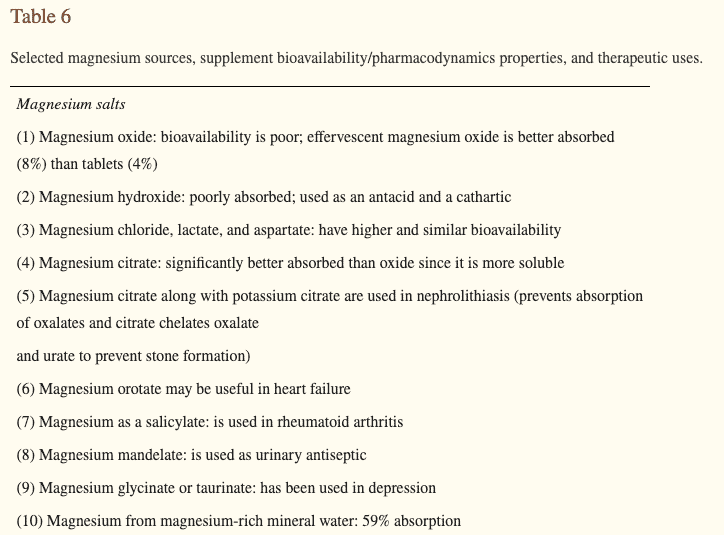
Magnesium glycinate solves the problem of low bioavailability by combining magnesium with the amino acid glycine.
For this reason, magnesium glycinate is typically the best form of magnesium to use if you are trying to get magnesium into your entire body.
This is the preferred form to use if you’ve had your magnesium level tested and found it to be low or low normal.
It’s also the form you want to use for better thyroid health and better health in general.
The dosing of magnesium glycinate varies, but most people do very well on a dose ranging from 150 to 300mg per day.
Magnesium glycinate is considered a chelated form of magnesium so other chelated versions of magnesium are also well absorbed and can be substituted in place of glycinate.
#2. Magnesium Citrate
What if you want your magnesium to stay inside your bowels or intestinal tract?
If that’s the case, then using something like magnesium glycinate or a chelated magnesium formulation is not your best bet.
Instead, you would want to use magnesium citrate.
This is because magnesium citrate, when taken in supplement form, acts to pull water into the intestinal tract.
As the water gets pulled into the intestinal tract it loosens the stool and makes which alleviates constipation.
Constipation is a symptom that plagues thyroid patients due to the impact that thyroid hormone has on peristalsis.
Even though a lot of the magnesium from magnesium citrate stays in the intestinal tract, doesn’t mean that all of it does.
You can still increase overall magnesium levels when using this form but it won’t be as effective as something like magnesium glycinate.

If you are a thyroid patient suffering from constipation and you’d like to supplement with magnesium then magnesium citrate is probably the best form for you.
The dosing of magnesium citrate is much more variable compared to the other forms we will talk about today because constipation exists on a spectrum.
The more severe your constipation, the higher the dose of magnesium you will need.
So instead of giving you a specific dose recommendation, is better to give you a titration schedule.
This allows you to find the perfect dose for your body.
You can self-titrate with 100mg or 150mg capsules of magnesium citrate, here’s how:
Start with 1 capsule and increase by 1 capsule each day until you experience loose stools.
When you experience loose stools just back down on your dose by 1-2 capsules and you will be at your ideal dose.
From my experience, thyroid patients need somewhere around 300 mg to 1,000 mg of magnesium citrate to help with constipation but I’ve seen doses in the 2,000 mg/day range in extreme cases.
Just be careful that you don’t accidentally take too much as that may result in diarrhea.
It’s not the end of the world but it’s best to avoid it if possible!
#3. Magnesium-L-Threonate
Finally, another formulation you may want to consider is magnesium threonate.
This form of magnesium is ideal for people suffering from brain-related thyroid symptoms such as depression, anxiety, mood disorders, headaches, or migraines.
Compared to other formulations of magnesium, especially magnesium sulfate, magnesium threonate is highly permeable through the blood-brain barrier (7).
The blood-brain barrier is a network of cells (8) and blood vessels designed to protect your brain from harmful substances.
Magnesium isn’t harmful per se, but it still can have trouble passing through this barrier based on what it is bound to.
Magnesium threonate is something that appears to pass through this barrier much easier than other formulations which is why it’s ideal for treating brain-related symptoms.
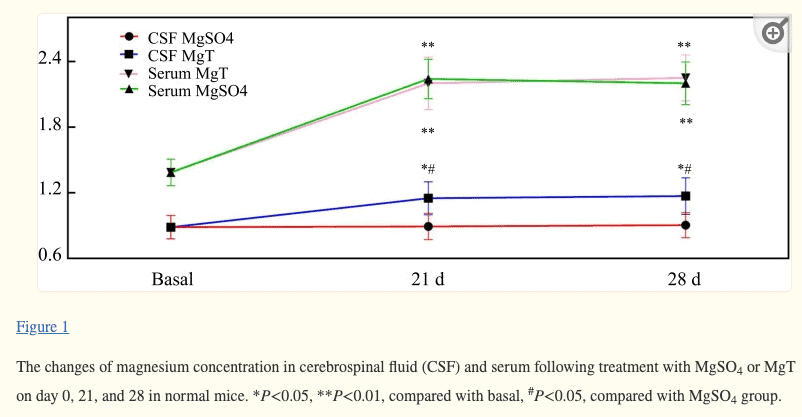
Because magnesium also tends to have a calming effect on the body, magnesium threonate can also be helpful for thyroid patients who suffer from jittery or hyperactive symptoms (nervous energy and the like).
If your thyroid is causing symptoms like anxiety, depression, or mood disturbances, then this form of magnesium would probably be best for you.
For best results, aim to use 2,000mg of magnesium threonate each day.
Getting Magnesium From Foods
Some people prefer to get their nutrients from foods and, if that’s you, then this section will be particularly helpful.
Before you opt to get your magnesium from foods, though, there are a few things you should know:
- Only about 30-40% of dietary magnesium is absorbed by the body. This means you will need to plan to eat probably a lot more food than you are thinking to get the same amount from supplements.
- It’s often much easier to get magnesium from supplements because, at the end of the day, taking 1-2 extra capsules is easier to get down than 1/2 a cup of spinach or a serving of chia seeds.
- Some foods high in magnesium may not be palatable to you personally! But if you can find foods that are naturally high in magnesium that you also love and enjoy eating then more power to you.
- Some foods high in magnesium may not be ideal for those with thyroid disease because the food itself may cause more harm than good. An example of this would be magnesium-fortified cereals which contain gluten and wheat. Other foods such as beans and legumes may cause intestinal bloating and gastric distress if you already have problems with your digestion.
Having said all of this, it’s still a perfectly fine strategy to get your magnesium from foods if that’s your goal, as long as you stay consistent in eating the right foods.
Foods that are naturally high in magnesium include (9):
- Pumpkin seeds – 156mg/serving
- Chia seeds – 111mg/serving
- Almonds – 80mg/serving
- Spinach – 78mg/serving
- Cashews – 74mg/serving
- Peanuts – 63mg/serving
- Shredded wheat cereal – 61mg/serving
- Soymilk – 61mg/serving
- Black beans – 60mg/serving
- Edamame (shelled, cooked) – 50mg/serving
- Peanut butter (smooth) – 49mg/serving
- Potato (baked) – 43mg/serving
- Banana – 32mg/serving
- Salmon (farmed Atlantic) – 26mg/serving
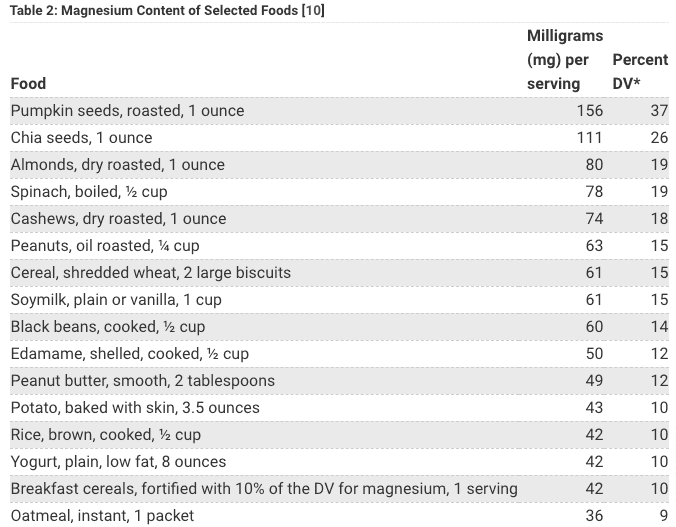
Instead of focusing just on magnesium supplements or just on magnesium-rich foods, I think it makes sense to use a combination of both.
Try to eat as many magnesium-rich whole foods as you can (which are palatable to you) while using over-the-counter magnesium supplements to make up the difference as needed.
This strategy will allow you to get other nutrients found in food while also helping to manage your thyroid symptoms.
Back to You
Magnesium is a crucial mineral that just about every patient with thyroid disease should be aware of.
Thyroid patients can use specific magnesium formulations to help control and manage some of their thyroid-related symptoms.
Based on my experience, the best way to optimize magnesium levels is through the use of a combination of food sources and natural dietary supplements.
Now I want to hear from you:
Were you aware of the importance of magnesium in the entire body? What about your thyroid gland?
Are you currently taking magnesium supplements? If so, what form are you taking?
Have you tried matching your magnesium formulation to your low thyroid symptoms? If not, are you planning on giving it a try?
Leave your questions or comments below!
Scientific References
#1. ncbi.nlm.nih.gov/pmc/articles/PMC4455825/
#2. ncbi.nlm.nih.gov/pmc/articles/PMC4960558/
#3. ncbi.nlm.nih.gov/pmc/articles/PMC6028657/
#4. ncbi.nlm.nih.gov/pmc/articles/PMC7649274/
#5. pubmed.ncbi.nlm.nih.gov/3336286/
#6. ncbi.nlm.nih.gov/pmc/articles/PMC5637834/
#7. ncbi.nlm.nih.gov/pmc/articles/PMC6857673/
#8. ncbi.nlm.nih.gov/pmc/articles/PMC4292164/
#9. ods.od.nih.gov/factsheets/Magnesium-HealthProfessional/
